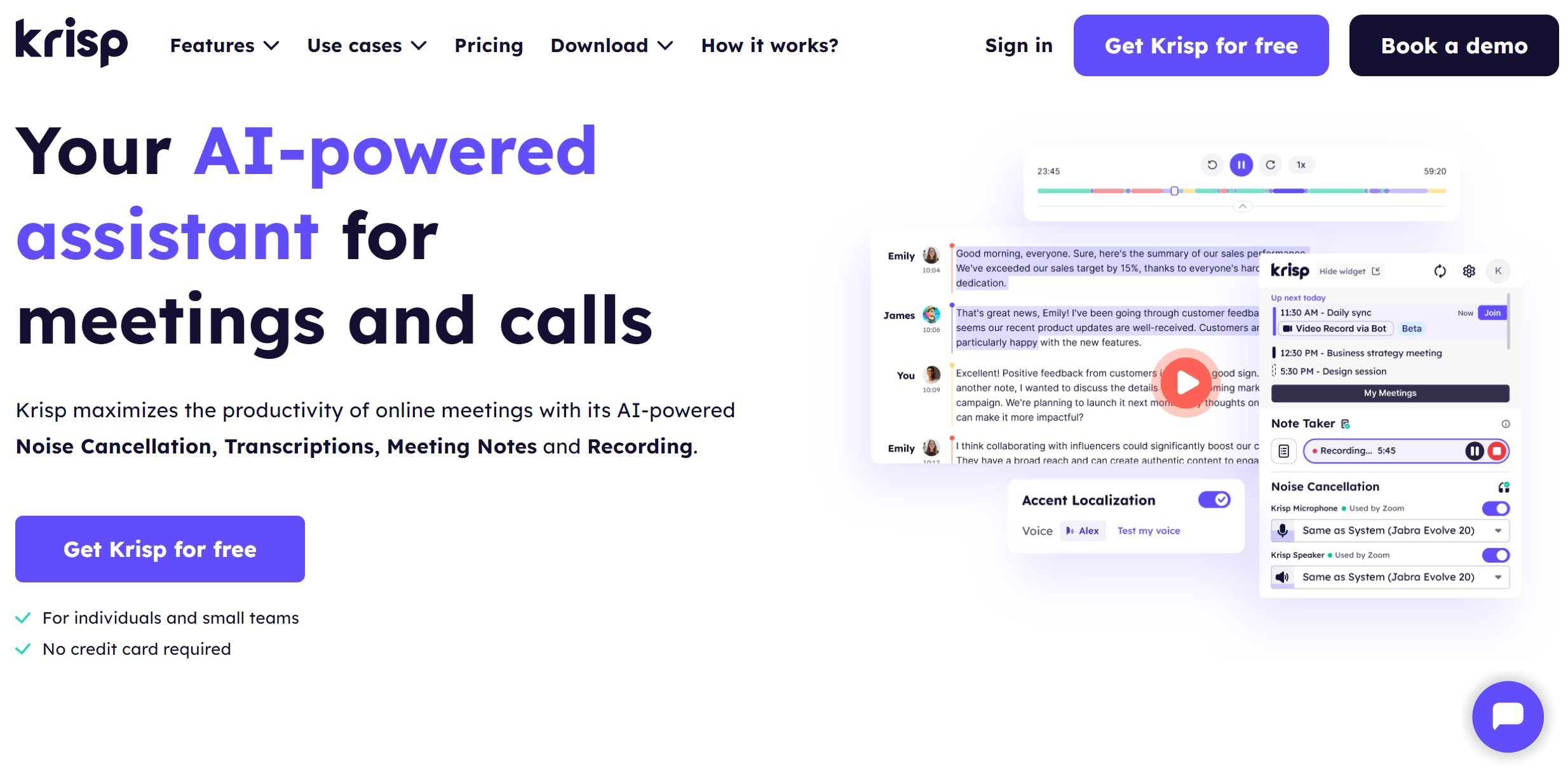Did you know 88% of job seekers find a healthy work culture vital for success, as a Forbes article says? The culture of a team is about the shared values, attributes, and beliefs that shape how teams work together.
How to build a strong team culture? After all, it’s more than perks. A strong team culture fosters collaboration, motivation, and success.
This article sheds light on team culture and its types. Moreover, it reveals how to build a strong team culture in the workplace with quotes and examples. Finally, this article unveils how Krisp AI Meeting Assistant helps build a positive culture, boosting productivity, engagement, and retention.
What Is Team Culture? Definition of Team Culture

How to define team culture? The Merriam-Webster dictionary defines culture as “the set of shared attitudes, values, goals, and practices that characterize an institution or organization.”
Deloitte describes culture as “the way things work around here.” Namely, it refers to the values, beliefs, behaviors, artifacts, and reward systems that top leadership drives to influence people’s behavior daily.
Specifically, team culture defines how teams work together based on shared values, behaviors, and goals. Different departments may have distinct cultures, but a strong culture of a team boosts team morale and collaboration. Additionally, it enhances productivity, knowledge-sharing, and adaptability among team members.
Effective teams support one another, leverage strengths, and adjust to challenges. They aim to navigate change and achieve organizational goals in a healthy, productive work environment. As a result, a positive team culture leads to effective team dynamics. Team dynamics represents the psychological and behavioral relationships between group or team members.
Team Culture vs. Company Culture
Company culture and team culture aren’t the same. As you read, the culture of a team refers to how team members share knowledge and support one another, contributing to company culture.
Compared, think of company culture as the company’s “personality.” Specifically, board members set the mission, goals, and ethics that shape the organizational or company culture.
As one of the CEOs of AI startups says about company and team cultures, “A corporate culture is a set of shared attitudes, values, goals and practices that characterize a company as a whole — and it’s usually appointed by the CEOs based on how we want to do things and what kinds of impacts we want to make. Team cultures are controlled by managers and reflect their stance on the attitudes and behaviors the company shares.”
What Is Positive Team Culture?
Are you interested in how to change the culture of a team to make it positive and strong? A positive team culture is based on individual and group goals, such as career growth and productivity.
A positive team culture includes diversity, collaboration, flexibility, and well-being programs. These programs can consist of flexible working and celebrating team members’ success.
A positive team culture:
- Promotes personal and professional growth, open communication, and shared values
- Makes employees feel valued, supported, and empowered through empathetic listening, feedback, and continuous learning
- Fosters trust, appreciation, and support
Team Culture Examples in Successful Organizations
Google fosters a culture of innovation by encouraging employees to dedicate 20% of their time to personal projects. This autonomy promotes creativity and has led to products like Gmail and AdSense. As a result, this open and collaborative environment empowers teams to experiment and share ideas freely.
- Experian
Experian, named the best workplace in tech in 2024, prioritizes diversity and equity. The company fosters a high-performing and innovative culture where employees feel valued and engaged. Employees are delighted with their teams, compensation, and work environment. As a result, the positive atmosphere at Experian promotes personal growth, collaboration, and employee well-being.
- HubSpot
HubSpot’s culture code is based on a positive and employee-centric culture focusing on work-life balance and mutual support. Specifically, this culture code emphasizes autonomy, flexibility, and satisfaction through its HEART (humble, empathetic, adaptable, remarkable, transparent) values.
Why Is a Good Team Culture Important?
A strong team culture boosts retention, engagement, productivity, and inclusion, driving business success.
- Connection: Employees in positive cultures feel valued and connected and get more satisfied with their jobs. A study by MIT has revealed that employees with a sense of belonging are 3.5 times more productive than those without it.
- Retention: Employees in aligned cultures are less likely to leave and are more likely to recommend their workplace. According to Gallup’s research on employee retention, employee turnover has peaked in almost a decade.
- Engagement: Engaged teams are more productive, while disengagement increases absenteeism and turnover costs. Gallup reports that only 23% of employees worldwide and 33% in the U.S. are “engaged.”
- Productivity: Highly engaged teams are more productive. Compared, companies lose money and productivity because of disengaged employees. Gallup’s research reveals that employee disengagement results in 37% higher absenteeism, 18% lower productivity, and 15% lower profitability.
- Teamwork: Collaboration improves job satisfaction, relationships, and innovation. As a result, teams start working effectively and with higher engagement. According to Gallup, higher engagement results in 18% higher productivity and 23% higher profitability.
- Development: Most employees stay longer at companies that invest in their learning and mentorship programs. Research shows that employees with professional development opportunities are 15% more engaged and have 34% higher retention.
- Inclusion: Safe, inclusive cultures enhance teamwork and resilience. As a result, negative behaviors don’t hinder group performance. According to the Pew Research Center, 56% of employed U.S. adults consider the focus on diversity, equity, and inclusion (DEI) at work a good thing.
As a result, a positive team culture fosters diverse thinking, creativity, and better decision-making. Thus, team members continuously learn, grow, and contribute to the organization.
Team Culture Types

Here are team culture types based on the information provided by tech company MentorcliQ and Western University’s report on organizational culture and retention:
1. Traditional or Conventional Culture
- This culture can be characterized as structured, hierarchical, and rule-driven.
- Values professionalism, predictability, and adherence to protocols.
- Decision-making is top-down.
- Fosters stability but limits flexibility.3
2. People-First Culture
- Prioritizes employee well-being and engagement.
- Offers mentorship, work-life balance, and open feedback for growth.
- Encourages trust, collaboration, and continuous improvement in a supportive environment.
3. Self-Actualization Culture
- Encourages creativity, innovation, and personal fulfillment.
- Employees think independently and explore new ideas.
- Employees engage in meaningful, challenging work that fosters growth and learning.
4. Affiliative Culture
- Leader-driven, focusing on employee support, transparency, and recognition.
- Encourages friendly and open relationships
- Promotes teamwork and a positive, trust-based work environment.
5. Competitive Culture
- Promotes goal-driven achievement and skill development.
- If balanced, this culture fosters external competitiveness.
- If mismanaged, it may create internal rivalry and discourage teamwork.
6. Inclusive Culture
- Emphasizes diversity, equity, and inclusion (DEI).
- Ensures equal opportunities and personalized benefits
- Offers an environment where employees feel valued and empowered.
7. High-Performance Culture
- This culture is result-driven.
- Prioritizes excellence, continuous learning, and career development.
- Encourages employees to become industry leaders through mentorship and skill-building.
8. Collaborative Culture
- Encourages teamwork, knowledge-sharing, and open communication.
- Employees work closely together.
- Leadership values transparency and collective problem-solving.
9. Post-Merger Culture
- Emerges after two companies merge, creating a period of uncertainty and adjustment.
- Strong leadership and open discussions help integrate teams and establish stability.
10. Approval Culture
- Prioritizes harmony and agreement, where employees seek validation and avoid conflicts.
- Fosters a pleasant environment, but it may discourage constructive criticism and innovation.
11. Dependent Culture
- This culture can be characterized by centralized decision-making
- Employees follow strict hierarchical structures.
- Employees rely on leadership for approval, which results in limited autonomy and innovation.
12. Avoidance Culture
- Offers a risk-averse environment where mistakes are punished, not learned from.
- Employees shift blame to avoid consequences.
- Features hesitancy and lack of accountability.
13. Oppositional Culture
- Encourages confrontation and criticism.
- Debate is valued.
- However, excessive negativity may create a hostile work environment and hinder collaboration.
14. Power Culture
- This culture is authority-based, where influence comes from position and control.
- Encourages leadership ambition
- May limit participation and teamwork if too rigid.
15. Competence or Perfectionistic Culture
- Values perfection, persistence, and high standards.
- Employees avoid mistakes and work long hours.
- Potentially, this culture can lead to stress and burnout.
16. Achievement Culture
- Focuses on goal-setting, performance, and continuous improvement.
- Employees set ambitious yet realistic objectives.
- Fosters motivation and productivity.
How to Build a Strong Team Culture
How to improve team culture to make it stronger? Effective leaders know that their behavior influences team engagement. For instance, Ed Bastian, CEO of Delta Airlines, changed the company’s culture by focusing on employee well-being.
Specifically, Bastian helped employees cope with stress and boost mental health. Besides, Bastian improved communication, feedback, compensation, and benefits.
1. Align Your Team Values With Company Goals and Objectives
Align your team with the company’s mission and values to foster unity, focus, and productivity. For example, a customer-focused company values empathy and service. In contrast, an innovation-driven company prioritizes creativity and learning. Thus, reinforcing these values in daily tasks and decision-making can help employees contribute effectively to business success.
2. Build Openness, Honesty, and Trust
Trust helps build open communication, collaboration, and problem-solving. So, how to build trust in a team? Team-building activities like icebreakers and problem-solving challenges help employees connect and feel valued, engaged, and motivated. Because honesty, positivity, and strong leadership foster a supportive and high-performing team.
3. Encourage Transparency and Communication
Teams with clear, transparent communication enjoy higher collaboration, knowledge-sharing, and alignment with company values. How? Open communication helps employees learn from each other and work towards common goals, such as increased productivity and revenue, instead of competing.
4. Recognize Accomplishments and Reward Performance
Effective employee recognition and rewards boost motivation, engagement, and morale. Specifically, celebrate successes through public recognition and performance-based incentives. Moreover, personalized rewards, such as bonuses, promotions, or professional development opportunities, show appreciation and foster a culture of collaboration and belonging.
5. Use Technology to Boost Productivity
Use technology to strengthen teamwork in traditional, hybrid, and virtual workplaces. For example, video conferencing tools like Zoom and team communication platforms like Slack keep employees connected. Importantly, AI-powered tools like Krisp AI Meeting Assistant enhance remote communication, boost engagement, and facilitate real-time collaboration online.
How Krisp Helps Build a Productive Remote Team Culture

A positive team culture based on trust, purpose, open communication, and shared values leads to a positive workplace culture.
Krisp AI Meeting Assistant knows how to build a team culture that drives connection, growth, and long-term success. TIME’s top pick for note-taking apps without an in-meeting bot, Krisp AI Meeting Assistant, offers excellent usability, premium features, and competitive pricing.
Krisp Stands Out With:
- On-device Recording and Transcription
- Bot-less Experience
- Superior UX
Krisp Offers:
- AI Noise Cancellation with the most powerful noise suppression
- AI Meeting Recording with unprecedented audio quality
- AI Meeting Transcription with an exceptional 96% accuracy
- AI Meeting Notes & Summaries without errors
How to Build Culture in a Team Using Krisp
“Individually, we are one drop. Together, we are an ocean,” said Japanese author Ryunosuke Satoro. Our goals, values, and culture in teams are based on team or group norms. Team norms are unwritten rules or standards that ensure team consistency, predictability, and cohesion.
So, how can Krisp AI Meeting Assistant help you build a strong team culture to gather drops into an ocean? Krisp’s features provide:
- Distraction-free Environment for Productive and Effective Discussions: Krisp eliminates background noises, voices, and echoes so you can focus on discussions and brainstorming. By the way, Krisp’s AI Meeting Assistant has pioneered the world’s first AI-powered Voice Productivity software.
- Meeting Recording, including Screen Recording, for Higher Accessibility: Krips has the best audio quality for storing your virtual discussions. So, all team members, including absentees, won’t miss critical ideas. Revisit and review the stored discussions later. Did you know Krisp doesn’t need to join the calls to record them?
- Automatic and Multilingual Transcriptions, including the Import and Transcribe feature, for Enhanced Communication: Krisp offers exceptional accuracy and stellar speaker recognition for transcriptions. Krisp automatically transcribes online discussions instead of you to enhance engagement and collaboration. Besides, you can upload a meeting recording to Krisp and get the transcription.
- Error-free Meeting Notes and Summaries for Enhanced Collaboration: Krisp provides critical takeaways meticulously. So you can actively engage in discussions and brainstorming with your team. Then, you can make the necessary changes to these notes and include them in a meeting notes template to share with others.
Krisp’s flagship Noise Cancellation technology is already working on 200M+ devices and processing 80B+ minutes of conversations daily. Moreover, Krisp’s AI Meeting Assistant is compatible with WinOS and MacOS and works well with all videoconferencing tools like Zoom, Goole Meet, and Microsoft Teams.
Quotes About Team Culture
- “Great things are never done by one person. They’re done by a team.” ― Steve Jobs, a businessman, inventor, and investor
- “A team is not a group of people who work together. A team is a group of people who trust each other.” ― Simon Sinek, an author and inspirational speaker on business leadership
- “Coming together is a beginning. Keeping together is progress. Working together is success.” ― Henry Ford, an industrialist and business magnate
- “Strength lies in differences, not in similarities.” ― Stephen Covey, an educator, author, businessman, and speaker
- “Individual commitment to a group effort – that is what makes a team work, a company work, a society work, a civilization work.” ― Vince Lombardi, an educator, author, businessman, and speaker
- “Culture is about performance, and making people feel good about how they contribute to the whole.” ― Tracy Streckenbach, an executive leader and board advisor
- “Great teams do not hold back with one another. They are unafraid to air their dirty laundry. They admit their mistakes, their weaknesses, and their concerns without fear of reprisal.” ― Patrick Lencioni, author of books on business management
- “People are always good company when they are doing what they really enjoy.” Samuel Butler, a novelist and critic
- “It’s about getting the best people, retaining them, nurturing a creative environment & helping to find a way to innovate.”- Marissa Mayer, a business executive and investor
- “The culture of a workplace – an organization’s values, norms and practices – has a huge impact on our happiness and success.” – Adam Grant, science author, and professor
Building Team Culture Is Vital
A strong team culture fosters collaboration, engagement, and productivity. As a result, employees feel valued and connected. Investing in the right culture and technology creates a more inclusive, efficient, and motivated workforce.
Tools like Krisp AI Meeting Assistant enhance team culture by eliminating background noise, improving communication, and enabling seamless collaboration in virtual meetings.
Frequently Asked Questions
Moreover, a positive culture in a team encourages open communication, constructive feedback, and professional growth. This fosters a workplace where people thrive and contribute meaningfully.





